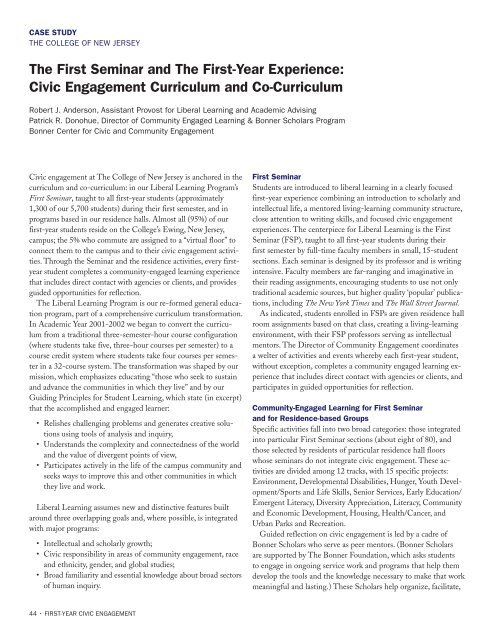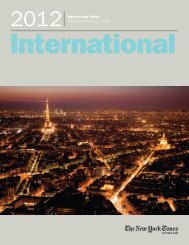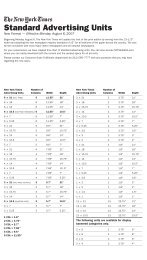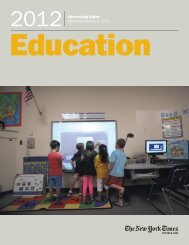CASE STUDYTHE COLLEGE OF NEW JERSEYThe <strong>First</strong> Seminar and The <strong>First</strong>-<strong>Year</strong> Experience:<strong>Civic</strong> <strong>Engagement</strong> Curriculum and Co-CurriculumRobert J. Anderson, Assistant Provost <strong>for</strong> Liberal Learning and Academic Advising Bonner Center <strong>for</strong> <strong>Civic</strong> and Community <strong>Engagement</strong><strong>Civic</strong> engagement at The <strong>College</strong> of New Jersey is anchored in thecurriculum and co-curriculum: in our Liberal Learning Program’s<strong>First</strong> Seminar, taught to all first-year students (approximately1,300 of our 5,700 students) during their first semester, and inprograms based in our residence halls. Almost all (95%) of ourfirst-year students reside on the <strong>College</strong>’s Ewing, New Jersey,campus; the 5% who commute are assigned to a “virtual floor” toconnect them to the campus and to their civic engagement activities.Through the Seminar and the residence activities, every firstyearstudent completes a community-engaged learning experiencethat includes direct contact with agencies or clients, and providesguided opportunities <strong>for</strong> reflection.The Liberal Learning Program is our re-<strong>for</strong>med general educationprogram, part of a comprehensive curriculum trans<strong>for</strong>mation.In Academic <strong>Year</strong> 2001-2002 we began to convert the curriculumfrom a traditional three-semester-hour course configuration(where students take five, three-hour courses per semester) to acourse credit system where students take four courses per semesterin a 32-course system. The trans<strong>for</strong>mation was shaped by ourmission, which emphasizes educating “those who seek to sustainand advance the communities in which they live” and by ourGuiding Principles <strong>for</strong> Student Learning, which state (in excerpt)that the accomplished and engaged learner: tionsusing tools of analysis and inquiry, and the value of divergent points of view, seeks ways to improve this and other communities in whichthey live and work.Liberal Learning assumes new and distinctive features builtaround three overlapping goals and, where possible, is integratedwith major programs: and ethnicity, gender, and global studies; of human inquiry.<strong>First</strong> SeminarStudents are introduced to liberal learning in a clearly focusedfirst-year experience combining an introduction to scholarly andintellectual life, a mentored living-learning community structure,close attention to writing skills, and focused civic engagementexperiences. The centerpiece <strong>for</strong> Liberal Learning is the <strong>First</strong>Seminar (FSP), taught to all first-year students during theirfirst semester by full-time faculty members in small, 15-studentsections. Each seminar is designed by its professor and is writingintensive. Faculty members are far-ranging and imaginative intheir reading assignments, encouraging students to use not onlytraditional academic sources, but higher quality ‘popular’ publications,including The New York Times and The Wall Street Journal.As indicated, students enrolled in FSPs are given residence hallroom assignments based on that class, creating a living-learningenvironment, with their FSP professors serving as intellectualmentors. The Director of Community <strong>Engagement</strong> coordinatesa welter of activities and events whereby each first-year student,without exception, completes a community engaged learning experiencethat includes direct contact with agencies or clients, andparticipates in guided opportunities <strong>for</strong> reflection.Community-Engaged Learning <strong>for</strong> <strong>First</strong> Seminarand <strong>for</strong> Residence-based GroupsSpecific activities fall into two broad categories: those integratedinto particular <strong>First</strong> Seminar sections (about eight of 80), andthose selected by residents of particular residence hall floorswhose seminars do not integrate civic engagement. These activitiesare divided among 12 tracks, with 15 specific projects:Environment, Developmental Disabilities, Hunger, Youth Development/Sportsand Life Skills, Senior Services, Early Education/Emergent Literacy, Diversity Appreciation, Literacy, Communityand Economic Development, Housing, Health/Cancer, andUrban Parks and Recreation.Guided reflection on civic engagement is led by a cadre ofBonner Scholars who serve as peer mentors. (Bonner Scholarsare supported by The Bonner Foundation, which asks studentsto engage in ongoing service work and programs that help themdevelop the tools and the knowledge necessary to make that workmeaningful and lasting.) These Scholars help organize, facilitate,
and debrief the service activities, and serve as recruiters <strong>for</strong> additionalstudent participation, particularly <strong>for</strong> students willingto continue with their service assignments beyond the requiredamount.Community-Engaged Learning DaysCommunity-Engaged Learning (CEL) days provide opportunities<strong>for</strong> groups of students (25 to 45) who live on the same floorto decide how they will learn, serve, and reflect together as partof a democratic community. TCNJ Bonner Scholars and BonnerPeer Advisors take the lead in every phrase of the program. Theycompile educational, reflection, and community-based researchmaterials; act as crew leaders of each small group of first-year studentsas they work on their service project; help identify reflectionquestions; and lead small group sessions occurring when the workis done.For first-year students, the initial step occurs when they attendcivic engagement floor meetings early in the fall. At this time, theCEL calendar becomes a ballot and students rank their top threechoices. Based on results, entire floors or significant clusters ofstudents residing together on a floor are “assigned” to a specificCEL date on the calendar. Significantly, this initial democraticexperience — as well as others described below — is led by other,more “senior,” Bonner students. They do so in two key stages:In the organizing stage, these Bonners <strong>for</strong>m two-person teamswho organize (via emails, posters, etc.) and conduct 25 separatefloor meetings under the guidance of staff. Staff members sendout email reminders and register the bulk of the students from afloor. During the mobilizing stage, these Bonners conduct two“floor sweeps” three days prior to any CEL day to sign up studentswho have not yet confirmed their attendance. All the organizingleads to the actual CEL day, which has five main components:education, action, reflection, sustainability, and curricularwork. The goal is to provide context <strong>for</strong> the service and linkagesto ongoing co-curricular and curricular engagement.On the day of the CEL event, first-year students receive aneducational packet that includes articles covering the nature andscope of the problem and programs or policies that aim to havean impact on that social issue. The CEL day’s program beginswith a speaker addressing the issue in an educational and inspirationalway. After the talk, group members spend approximatelyfive hours together working on a meaningful project. After thatwork, they hold small-group discussions and reflection sessions.These first-year students are then asked if they are interested insustaining their involvement by working under the guidance of theBonners Scholars. They are also introduced to options <strong>for</strong> the secondtier of their civic engagement graduation requirement (whichmust be satisfied in their last three academic years) with examplesof community-based research and course-related projects from arange of institutions.In an alternate model, small teams of students from specificfloors (usually 8-10) are given the chance to complete a onedayshift at one of the community organizations where BonnerScholar Teams serve (e.g., Habitat <strong>for</strong> Humanity). The Bonnersite leader is responsible <strong>for</strong> working with the staff to shape, supervise,and transport first-year students on such dates — as wellas build in the same components described above that pertain toeducation, action and sustained involvement.AssessmentSurveys on learning outcomes from civic engagement in priorservice-learning programs and in the new <strong>First</strong> Seminar andthe <strong>First</strong>-<strong>Year</strong> Experience’s CEL days have shown high levels ofagreement that civic engagement advanced student understandingand appreciation of issues. Students’ reflective journals and focusgroup interviews confirm this.All first-year students complete a simple survey at the beginningand end of each CEL day. This tool attempts to measurepotential changes in their dispositions and levels of knowledge orawareness. For example, it aims to capture whether or not theybelieve that individuals working as part of a group can make adifference in their communities and whether or not they feelthat they themselves can have an impact. In addition, the surveystrives to determine if the students know a little more about aparticular social problem as well as existing policies/programs dueto their experience.The survey also addresses process and past participation. Forexample, students are asked how many times during the previousmonths they had an opportunity to meet (in a co-curricularsetting) with their peers to discuss an issue and hold a votethat actually mattered, and how frequently they interacted withsomeone passionate about their work on the unmet needs of thecommunity. The goal is to determine the significance of the floormeetings and educational portions of the program.Most importantly, at the conclusion of each CEL day, thestudents provide a grade <strong>for</strong> their experience and may completea Bonner Volunteer <strong>for</strong>m if they wish to continue serving theircommunity. A quick review of early data on this new programshows some promising results. The lowest grade on the day thatfocused on developmental disabilities, <strong>for</strong> example, was a B+;a substantial number of students are completing the volunteer<strong>for</strong>ms and want to receive additional invitations to serve.Finally, our community partners have expressed their strongsupport <strong>for</strong> this model. It provides students with pre-service contextsand understanding be<strong>for</strong>e their arrival into the community,and it helps some students to find their passion and stay involved.This increases the capacity of these agencies to achieve their objectives,as it develops students’ civic learning.Supplemental MaterialsWeb site <strong>for</strong> Liberal Learning Program:http://www.tcnj.edu/~liberal/
- Page 1: First-Year Civic Engagement:Sound F
- Page 5 and 6: CONTENTSivPrefaceMartha J. LaBare,
- Page 7: Zlotkowski, Edward, ed. (2002). Ser
- Page 10 and 11: we had the “great flood” of the
- Page 12 and 13: Requiring civic engagement demonstr
- Page 14 and 15: The preparation of citizens was one
- Page 16 and 17: preparation. At its heart, this wor
- Page 18 and 19: in it of particular interest to tho
- Page 20 and 21: often in tension. Political partici
- Page 22 and 23: educating students for active citiz
- Page 24 and 25: CHAPTER 4Civic Learning: Aligning P
- Page 26 and 27: Faces/Phases of CitizenshipFace/Pha
- Page 28 and 29: ecome more informed and participate
- Page 30 and 31: ReferencesAstin, A.W., Vogelgesang,
- Page 32 and 33: photography techniques to inmates a
- Page 34 and 35: CHAPTER 8Action Steps to Move theFi
- Page 36 and 37: ConclusionI wish to be very clear t
- Page 38 and 39: CASE STUDYALLEGHENY COLLEGECivic En
- Page 40 and 41: CASE STUDYANTIOCH COLLEGECivic Enga
- Page 42 and 43: CASE STUDYCALIFORNIA STATE UNIVERSI
- Page 44 and 45: CASE STUDYCALIFORNIA STATE UNIVERSI
- Page 46 and 47: CASE STUDYCHANDLER-GILBERT COMMUNIT
- Page 48 and 49: CGCC Global Engagement:http://www.c
- Page 50 and 51: student blog in which students are
- Page 54 and 55: I. Contributors’ Names and Contac
- Page 56 and 57: opportunities of CSU students and C
- Page 58 and 59: needs, and expectations of the serv
- Page 60 and 61: Although Times Talk began in Septem
- Page 62 and 63: CASE STUDYFRANKLIN PIERCE UNIVERSIT
- Page 64 and 65: We now have a comprehensive assessm
- Page 66 and 67: Another major assignment for this c
- Page 68 and 69: CASE STUDYHAMPDEN-SYDNEY COLLEGELiv
- Page 70 and 71: I. Contributors’ Names and Contac
- Page 72 and 73: Qualitative assessment begins with
- Page 74 and 75: 3. Lessons in Democracy. The IUPUI
- Page 76 and 77: CASE STUDYLEHIGH UNIVERSITYJudging
- Page 78 and 79: CASE STUDYMARS HILL COLLEGELifeWork
- Page 80 and 81: CASE STUDYMERCER UNIVERSITYInterdis
- Page 82 and 83: CASE STUDYMICHIGAN STATE UNIVERSITY
- Page 84 and 85: CASE STUDYPACE UNIVERSITYCivic Enga
- Page 86 and 87: Susan-Feather GannonProfessor, Tech
- Page 88 and 89: AssessmentData were gathered from s
- Page 90 and 91: CASE STUDYPITZER COLLEGEThe Communi
- Page 92 and 93: from people different from themselv
- Page 94 and 95: Table 1Summary of the Major Outcome
- Page 96 and 97: engaged stewards of the environment
- Page 98 and 99: HIV-positive individuals. They also
- Page 100 and 101: Students were then equipped to eval
- Page 102 and 103:
the World Affairs Council (WAC), in
- Page 104 and 105:
CASE STUDYTRINITY UNIVERSITYCivic E
- Page 106 and 107:
I. Contributors’ Names and Contac
- Page 108 and 109:
in the organization of health care
- Page 110 and 111:
study and a series of retreats as p
- Page 112 and 113:
ing based opportunities. Both semes
- Page 114 and 115:
engaging first-year students and st
- Page 116 and 117:
CASE STUDYWEBER STATE UNIVERSITY CO







